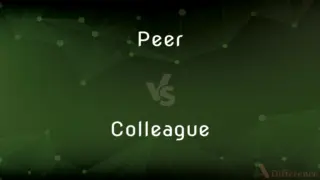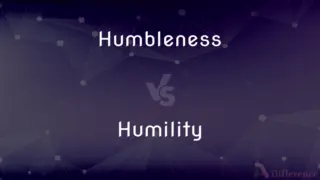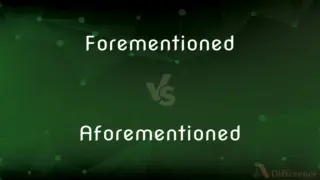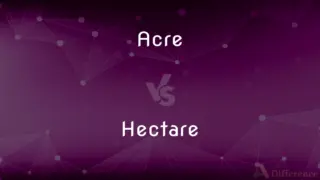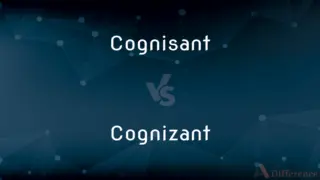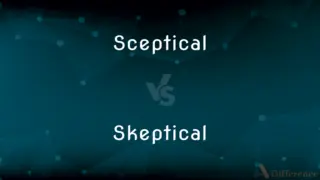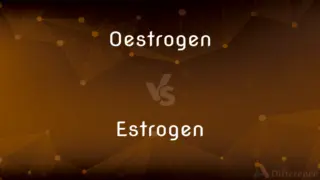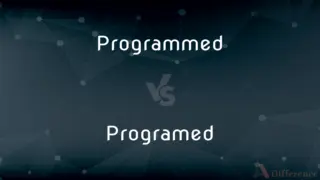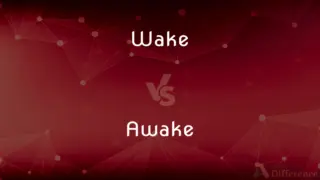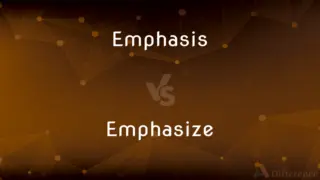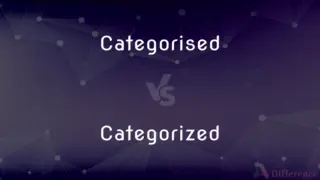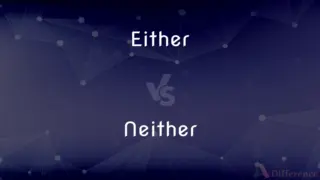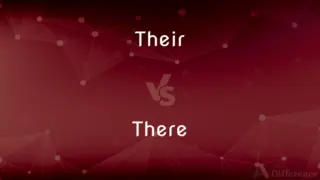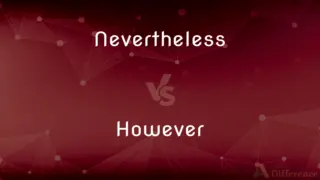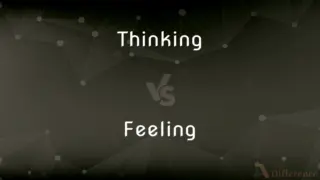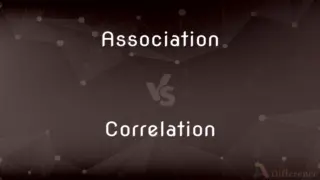Engrain vs. Entrain — What's the Difference?
By Tayyaba Rehman — Updated on September 27, 2023
Engrain means to implant firmly and deeply, often referring to ideas or habits. Entrain refers to coordinating rhythm or to carry along by the flow of a fluid. The terms differ in meaning and context of use.
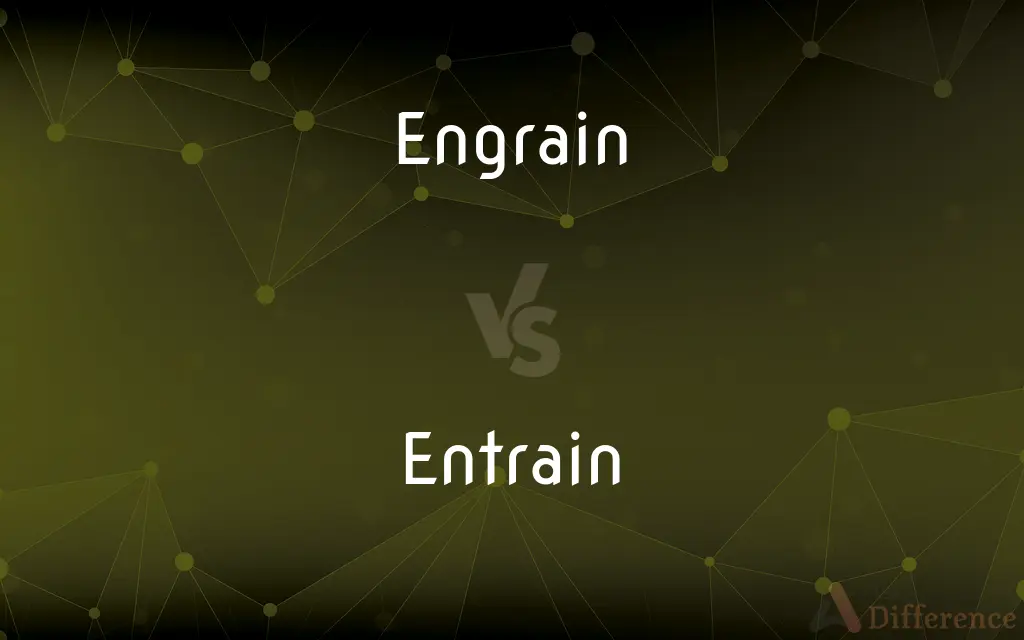
Difference Between Engrain and Entrain
Table of Contents
ADVERTISEMENT
Key Differences
Engrain and Entrain are distinct words, each serving a different purpose in language. Engrain typically refers to deeply implanting or instilling habits, beliefs, or ideas within an individual or group. It implies that a particular behavior, thought, or pattern has become deeply embedded or fixed. On the other hand, Entrain has meanings that are more varied, primarily relating to setting the pace or rhythm of a process or carrying along by the flow of a fluid.
Engrain has associations with permanency and depth, reflecting how ideologies or behaviors can become an integral part of an individual’s or a group's identity or lifestyle. This word is often used when referring to ingrained habits or beliefs that shape behavior and thought processes. In contrast, Entrain, when used in physics or biology, refers to the synchronization of rhythmic cycles or the transportation of particles by the flow of a fluid, having applications in various scientific contexts.
Engraining involves a deeply set and often long-lasting influence, suggesting that the subject, whether it be an idea, value, or habit, is firmly implanted within the psyche. This can relate to both positive and negative influences, shaping individuals' or communities' perspectives and actions. Entrain, alternatively, has a more technical application, such as in chronobiology, where it denotes the alignment of an organism’s internal biological rhythms with external rhythms, like light and dark cycles.
While engrain is more likely to be used in everyday language, reflecting deeply set beliefs or habits, entrain is primarily utilized in specific scientific and technical contexts. Entrainment is the process where two interacting oscillating systems assume the same period, highlighting the coordination and synchronization of different systems, while engrain symbolizes the deep-rooted and often enduring nature of certain thoughts, values, or behaviors.
Comparison Chart
Definition
To implant firmly and deeply.
To coordinate rhythm or to carry along by the flow of a fluid.
ADVERTISEMENT
Context of Use
Everyday language, relating to ingrained habits, beliefs, or ideas.
Specific scientific and technical contexts, relating to synchronization or fluid flow.
Nature
Reflects permanency and depth.
Denotes synchronization or carrying along.
Application
Applied to behaviors, thoughts, or patterns.
Applied in various scientific contexts, like physics and biology.
Implication
Implies that something is deeply embedded or fixed.
Implies coordination of rhythms or transportation of particles.
Compare with Definitions
Engrain
To implant or fix deeply and firmly, as in the nature or mind.
It's important to engrain good habits from a young age.
Entrain
To synchronize a physiological rhythm to an external rhythm.
Light exposure helps to entrain our biological clocks.
Engrain
To embed deeply, usually referring to ideas or principles.
The coach worked to engrain a sense of discipline in the team.
Entrain
To draw along with or after oneself.
The current will entrain the floating particles.
Engrain
To instill beliefs, attitudes, or habits firmly.
Values were engrained in him by his parents.
Entrain
To adjust the phase or period of a rhythm to align with another.
The sleep-wake cycle can entrain to the light-dark cycle.
Engrain
To establish firmly, often in relation to values or morals.
Her kindness is engrained in her personality.
Entrain
To carry along by a flow of air or water.
The wind will entrain the leaves.
Engrain
To become deeply embedded or established.
The importance of hard work is engrained in our culture.
Entrain
To pull along in a current.
Water droplets are entrained by the wind.
Engrain
To ingrain.
Entrain
To pull or draw along after itself.
Engrain
Alternative spelling of ingrain
Entrain
(Chemistry) To carry (suspended particles, for example) along in a current or into the vapor phase.
Engrain
To dye in grain, or of a fast color. See Ingrain.
Leaves engrained in lusty green.
Entrain
To go aboard a train.
Engrain
To incorporate with the grain or texture of anything; to infuse deeply. See Ingrain.
The stain hath become engrained by time.
Entrain
To put aboard a train.
Entrain
To draw along as a current does.
Water entrained by steam
Entrain
(chemistry) To suspend small particles in the current of a fluid.
Entrain
(mathematics) To set up or propagate a signal, such as an oscillation.
Entrain
(figuratively) To encarriage, to conjoin, to link; as in a series of entities, elements, objects or processes.
Entrain
(neurobiology) To become trained or conditioned in a pattern of brain behavior.
Entrain
To get into or board a railway train.
Entrain
(transitive) To put aboard a railway train.
To entrain a regiment
Entrain
To draw along as a current does; as, water entrained by steam.
Entrain
To put aboard a railway train; as, to entrain a regiment.
Entrain
To go aboard a railway train; as, the troops entrained at the station.
Entrain
Board a train
Common Curiosities
Is engrain associated with permanency and depth?
Yes, engrain is associated with permanency and depth, reflecting how ideologies or behaviors can become integral.
What does entrain primarily mean?
Entrain primarily refers to coordinating rhythm or to carrying along by the flow of a fluid.
Is entrain used in specific scientific contexts?
Yes, entrain is mainly used in specific scientific and technical contexts, such as in physics or biology.
Does entrain imply synchronization?
Yes, entrain implies the synchronization of different systems or the transportation of particles by the flow of a fluid.
Does engrain suggest that the subject is firmly implanted within the psyche?
Yes, engrain suggests that the subject, whether an idea, value, or habit, is firmly implanted within the psyche.
Can engrain be applied to thoughts or patterns?
Yes, engrain can be applied to behaviors, thoughts, or patterns that become deeply embedded or fixed.
Can engrain relate to both positive and negative influences?
Yes, engrain can relate to both positive and negative influences, shaping individuals' or communities' perspectives and actions.
Can engrain be used to describe deeply set beliefs or habits?
Absolutely, engrain is often used to describe deeply set beliefs, values, or habits that are firmly implanted within the psyche.
Can entrain be used in the context of biology?
Yes, entrain can be used in biology to describe the synchronization of an organism’s internal rhythms with external rhythms.
What does engrain typically refer to?
Engrain typically refers to deeply implanting or instilling habits, beliefs, or ideas within an individual or group.
Is entrain related to the coordination and synchronization of different systems?
Yes, entrain is related to the coordination and synchronization of different oscillating systems.
Does entrain denote carrying along by the flow of a fluid in physics?
Yes, in physics, entrain can denote the carrying along of particles by the flow of a fluid.
Is entrainment the process where two interacting oscillating systems assume the same period?
Exactly, entrainment is the process where two interacting oscillating systems assume a common period.
Can engrain symbolize enduring nature of certain thoughts or behaviors?
Yes, engrain can symbolize the deep-rooted and often enduring nature of certain thoughts, values, or behaviors.
Share Your Discovery

Previous Comparison
International vs. Local
Next Comparison
Senior vs. SpecialistAuthor Spotlight
Written by
Tayyaba RehmanTayyaba Rehman is a distinguished writer, currently serving as a primary contributor to askdifference.com. As a researcher in semantics and etymology, Tayyaba's passion for the complexity of languages and their distinctions has found a perfect home on the platform. Tayyaba delves into the intricacies of language, distinguishing between commonly confused words and phrases, thereby providing clarity for readers worldwide.

